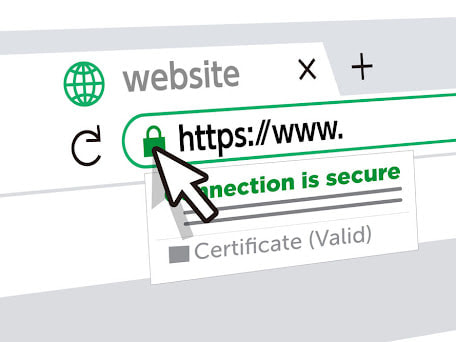SSL Certificate
Its Importance and
Why its Required
An SSL certificate is a digital certificate that authenticates a website's identity and enables an encrypted connection which keeps everything secure from unwanted intruders.
All about
Secure Sockets Layer
Certificates
Secure Sockets Layer (SSL) certificates are digital certificates that provide a secure and encrypted connection between a web server and a user's web browser. SSL certificates are used to establish a secure and encrypted connection, ensuring that sensitive data transmitted between the user's browser and the web server remains private and secure.
Here's how SSL certificates work:
The primary benefits of SSL certificates are:
To obtain an SSL certificate, website owners typically need to purchase one from a Certificate Authority (CA) or obtain a free one through some hosting providers. Once acquired, the SSL certificate is installed on the web server, enabling secure communication between the server and the users' browsers.
Here's how SSL certificates work:
- Encryption:
When a user visits a website with an SSL certificate installed, the web server and the user's web browser initiate an encrypted connection. This encryption process scrambles the data transmitted between the two parties, making it unreadable to anyone trying to intercept it. - Data Integrity:
SSL certificates also ensure data integrity, which means that the data exchanged between the web server and the browser remains unchanged during transmission. If any modification or tampering of the data occurs during transmission, the SSL certificate will detect it and invalidate the connection. - Authentication:
SSL certificates provide authentication, verifying the identity of the website's owner. This helps users trust that they are interacting with the legitimate website they intended to visit and not a malicious imposter. - Trust Indicators:
Websites with valid SSL certificates display trust indicators, such as a padlock icon in the web browser's address bar or "https://" at the beginning of the URL. These indicators assure users that their connection is secure.
The primary benefits of SSL certificates are:
- Security:
SSL certificates encrypt sensitive data, such as login credentials, credit card information, and personal details, preventing unauthorized access by hackers or cybercriminals. - Trust and Credibility:
SSL certificates enhance a website's trustworthiness and credibility among users. Visitors are more likely to trust a website with a secure connection, increasing their confidence in sharing personal information or making transactions. - Search Engine Ranking:
SSL certificates have become a ranking factor for search engines like Google. Websites with SSL certificates may receive a slight ranking boost in search results. - Compliance:
Many data protection regulations, such as the General Data Protection Regulation (GDPR), require websites to use SSL certificates when handling personal and sensitive data.
To obtain an SSL certificate, website owners typically need to purchase one from a Certificate Authority (CA) or obtain a free one through some hosting providers. Once acquired, the SSL certificate is installed on the web server, enabling secure communication between the server and the users' browsers.
SSL Certificate:
Why its Important
The SSL certificate is crucial for several reasons, as it plays a vital role in ensuring the security, trustworthiness, and credibility of a website.
Here's why the SSL certificate is important:
In summary, the SSL certificate is essential for safeguarding user data, establishing trust with visitors, complying with regulations, and protecting websites from various cyber threats. Implementing SSL is considered a best practice for website owners who prioritize security and wish to provide a safe browsing experience for their users.
Here's why the SSL certificate is important:
- Data Security:
The SSL certificate encrypts sensitive data exchanged between a user's web browser and the website's server. This encryption prevents hackers and cybercriminals from intercepting and accessing confidential information, such as login credentials, credit card details, and personal data. - User Trust and Confidence:
Websites with valid SSL certificates display trust indicators, such as a padlock icon or "https://" in the URL. These visual cues assure users that their connection is secure, increasing their trust and confidence in the website. - Protection Against Cyber Attacks:
SSL certificates help protect against various cyber attacks, such as man-in-the-middle attacks, data breaches, and phishing attempts. By securing data in transit, SSL prevents attackers from eavesdropping or tampering with the communication. - SEO and Search Engine Ranking:
Search engines, such as Google, consider SSL as a ranking factor. Websites with SSL certificates may receive a slight boost in search engine rankings, potentially improving their visibility in search results. - Compliance with Data Protection Regulations:
Many data protection regulations, such as the GDPR (General Data Protection Regulation), require websites to use SSL certificates when handling personal and sensitive data. Compliance with these regulations is essential to avoid legal issues and penalties. - Preventing Browser Warnings:
Modern web browsers, like Chrome and Firefox, display warning messages for websites without SSL certificates. These warnings can deter users from accessing the website and adversely affect its reputation. - Enhanced Customer Confidence:
For e-commerce websites, having an SSL certificate is critical to gain customers' confidence in making online transactions. It assures customers that their payment information is secure, encouraging them to complete purchases. - Preventing Information Interception:
Without SSL encryption, data transmitted over unsecured connections can be intercepted and misused by attackers, leading to identity theft and other fraudulent activities. - Protection for Login Credentials:
SSL certificates safeguard login credentials during user authentication processes, preventing unauthorized access to accounts and protecting user identities. - Security for Online Communication:
In addition to protecting sensitive data, SSL certificates ensure the security of all types of online communication, including email communication and API calls.
In summary, the SSL certificate is essential for safeguarding user data, establishing trust with visitors, complying with regulations, and protecting websites from various cyber threats. Implementing SSL is considered a best practice for website owners who prioritize security and wish to provide a safe browsing experience for their users.

